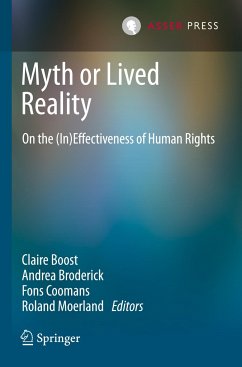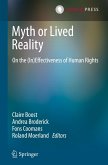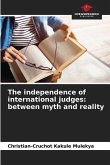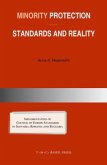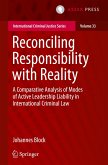Chapters How Human Rights Cross-Pollinate and Take Root: Local Governments & Refugees in Turkey by Elif Durmus and Human Rights Localisation and Individual Agency: From 'Hobby of the Few' to the Few Behind the Hobby by Tihomir Sabchev, Sara Miellet, and Elif Durmus are available open access under a Creative Commons Attribution 4.0 International License via link.springer.com
This book seeks to explore, from a multidisciplinary perspective, whether human rights are, in fact, a myth or a lived reality. Over the years much has been said about their effectiveness or, rather, their ineffectiveness.
This perceived ineffectiveness relates not only to institutional challenges at the international level, but also to national implementation mechanisms and processes. In addition, questions have arisen as to whether individuals or groups of individuals actually benefit from the normative guarantees contained in humanrights law and whether human rights as legal constructs canbe effectively translated into better outcomes.
This volume can be distinguished from the existing literature by virtue of the fact that it not only brings together scholars at different stages of their careers, but also that it incorporates contributions that adopt different methodological perspectives and cover a variety of topics.
The book should prove of great benefit to human rights researchers, human rights practitioners, NGOs and students.
Claire Boost is a PhD Candidate at the Department of Criminal Law and Criminology, Maastricht University.
Andrea Broderick is an Assistant Professor at the Department of International and European Law, Maastricht University.
Fons Coomans is a Professor at the UNESCO Chair in Human Rights and Peace, Department of International and European Law, Maastricht University.
Roland Moerland is an Assistant Professor at the Department of Criminal Law and Criminology, Maastricht University.
This book seeks to explore, from a multidisciplinary perspective, whether human rights are, in fact, a myth or a lived reality. Over the years much has been said about their effectiveness or, rather, their ineffectiveness.
This perceived ineffectiveness relates not only to institutional challenges at the international level, but also to national implementation mechanisms and processes. In addition, questions have arisen as to whether individuals or groups of individuals actually benefit from the normative guarantees contained in humanrights law and whether human rights as legal constructs canbe effectively translated into better outcomes.
This volume can be distinguished from the existing literature by virtue of the fact that it not only brings together scholars at different stages of their careers, but also that it incorporates contributions that adopt different methodological perspectives and cover a variety of topics.
The book should prove of great benefit to human rights researchers, human rights practitioners, NGOs and students.
Claire Boost is a PhD Candidate at the Department of Criminal Law and Criminology, Maastricht University.
Andrea Broderick is an Assistant Professor at the Department of International and European Law, Maastricht University.
Fons Coomans is a Professor at the UNESCO Chair in Human Rights and Peace, Department of International and European Law, Maastricht University.
Roland Moerland is an Assistant Professor at the Department of Criminal Law and Criminology, Maastricht University.

